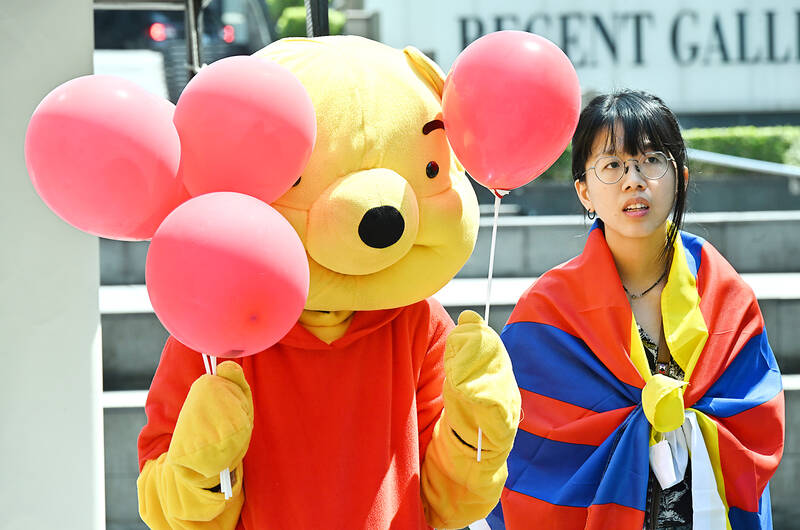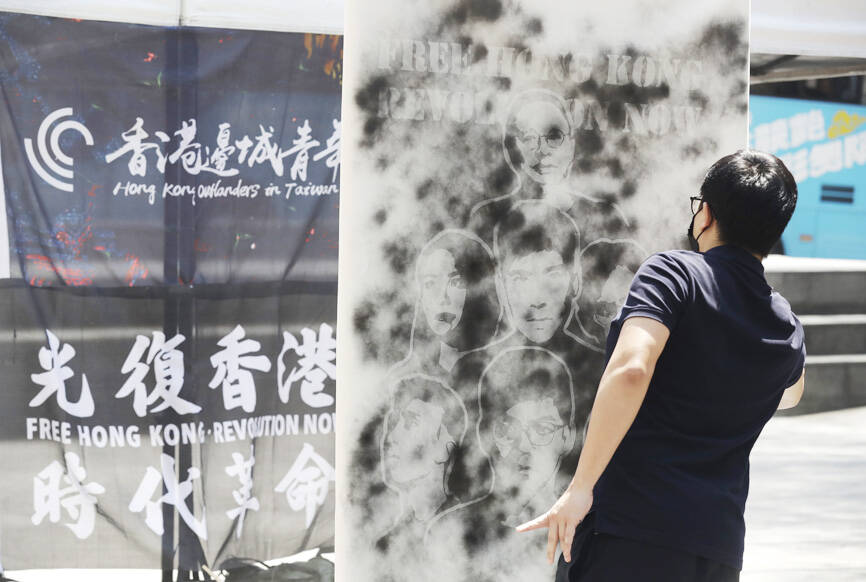Protesters in Taipei yesterday said that the cross-strait peace Beijing advocates for is a ploy to annex Taiwan.
Demonstrators at the protest to commemorate the anniversary of the implementation of Article 23 of the Hong Kong Basic Law spoke out against the Hong Kong government’s efforts to persecute Hong Kongers migrating abroad.
During a street theater performance, a person wearing a Winnie the Pooh costume — a reference to Chinese President Xi Jinping (習近平) — distributed red balloons filled with “sugar-coated lies,” which were “exposed” by Hong Kongers, Tibetans and Uighurs.

Photo: Tien Yu-hua, Taipei Times
Artists at the protest spray-painted imagery of the “Hong Kong 47” democracy campaigners charged with conspiracy to commit subversion under Hong Kong’s National Security Law. Forty-five of them have been jailed. They also created images of Apple Daily founder Jimmy Lai (黎智英), who was accused of colluding with foreign forces, and Chow Hang-tung (鄒幸彤), who was imprisoned for commemorating victims of the 1989 Tiananmen Square Massacre.
Hong Kong Outlanders chairman Sky Fung (馮紹天) said Article 23 was blocked in 2003 after 500,000 Hong Kongers protested the legislation, which allows the territory to enact laws to prohibit acts of treason, secession, sedition or subversion of the Chinese government.
However, Hong Kongers’ freedoms have been devastated since the implementation of the Beijing-imposed National Security Law in 2020, and in March last year, the Hong Kong government reintroduced and passed Article 23, which has been used to suppress freedoms, Fung said.

Photo: Chiang Ying-ying, AP
Taiwanese human rights advocate Lee Ming-che (李明哲), who was detained by Chinese authorities in late March 2017 on subversion charges and released in April 2022, said that Hong Kongers dared not reject Article 23 last year because of the National Security Law.
To control the territory, Hong Kong Chief Executive John Lee (李家超) made “inciting subversion of state power” a crime, which led to the dissolution of many pro-democracy political parties and organizations, Lee Ming-che said.
Under Article 23, a person could be sentenced for up to 14 years in prison for failure to report suspicious activity, Lee Ming-che said, adding that the Hong Kong government can use the law to interrogate families of Hong Kongers who fled to other countries.
A person could be sentenced to prison for simply wearing a T-shirt featuring the “Revolution of Our Times” (時代革命) slogan, which was used in democracy protests in Hong Kong in 2019 and 2020, he said.
The Hong Kong police can arbitrarily arrest a person if they believe they would commit a crime, he added.
“In Taiwan, we are used to democracy and the freedom to criticize the government. Anyone who wants to travel to Hong Kong should think twice, because every move you take for granted here might be considered a crime,” Lee Ming-che said.
The ultimate authority to interpret Article 23 lies with the Standing Committee of the National People’s Congress of the People’s Republic of China, rather than the Hong Kong courts, he said.
“Anyone in Taiwan who wants to sign a peace treaty with China might want to look at what has transpired in Hong Kong first,” he added.
While Beijing aims to further integrate Hong Kong into its socioeconomic system and make it an example of “one country, two systems,” Hong Kong’s economy has worsened, proving that it does not work, he said.
Because of the policy, Hong Kongers’ consumption in nearby Shenzhen in China’s Guangdong Province rose 53 percent, while 300,000 Hong Kongers have migrated to other countries in the past few years, he said.

Right-wing political scientist Laura Fernandez on Sunday won Costa Rica’s presidential election by a landslide, after promising to crack down on rising violence linked to the cocaine trade. Fernandez’s nearest rival, economist Alvaro Ramos, conceded defeat as results showed the ruling party far exceeding the threshold of 40 percent needed to avoid a runoff. With 94 percent of polling stations counted, the political heir of outgoing Costa Rican President Rodrigo Chaves had captured 48.3 percent of the vote compared with Ramos’ 33.4 percent, the Supreme Electoral Tribunal said. As soon as the first results were announced, members of Fernandez’s Sovereign People’s Party

MORE RESPONSIBILITY: Draftees would be expected to fight alongside professional soldiers, likely requiring the transformation of some training brigades into combat units The armed forces are to start incorporating new conscripts into combined arms brigades this year to enhance combat readiness, the Executive Yuan’s latest policy report said. The new policy would affect Taiwanese men entering the military for their compulsory service, which was extended to one year under reforms by then-president Tsai Ing-wen (蔡英文) in 2022. The conscripts would be trained to operate machine guns, uncrewed aerial vehicles, anti-tank guided missile launchers and Stinger air defense systems, the report said, adding that the basic training would be lengthened to eight weeks. After basic training, conscripts would be sorted into infantry battalions that would take

GROWING AMBITIONS: The scale and tempo of the operations show that the Strait has become the core theater for China to expand its security interests, the report said Chinese military aircraft incursions around Taiwan have surged nearly 15-fold over the past five years, according to a report released yesterday by the Democratic Progressive Party’s (DPP) Department of China Affairs. Sorties in the Taiwan Strait were previously irregular, totaling 380 in 2020, but have since evolved into routine operations, the report showed. “This demonstrates that the Taiwan Strait has become both the starting point and testing ground for Beijing’s expansionist ambitions,” it said. Driven by military expansionism, China is systematically pursuing actions aimed at altering the regional “status quo,” the department said, adding that Taiwan represents the most critical link in China’s

EMERGING FIELDS: The Chinese president said that the two countries would explore cooperation in green technology, the digital economy and artificial intelligence Chinese President Xi Jinping (習近平) yesterday called for an “equal and orderly multipolar world” in the face of “unilateral bullying,” in an apparent jab at the US. Xi was speaking during talks in Beijing with Uruguayan President Yamandu Orsi, the first South American leader to visit China since US special forces captured then-Venezuelan president Nicolas Maduro last month — an operation that Beijing condemned as a violation of sovereignty. Orsi follows a slew of leaders to have visited China seeking to boost ties with the world’s second-largest economy to hedge against US President Donald Trump’s increasingly unpredictable administration. “The international situation is fraught